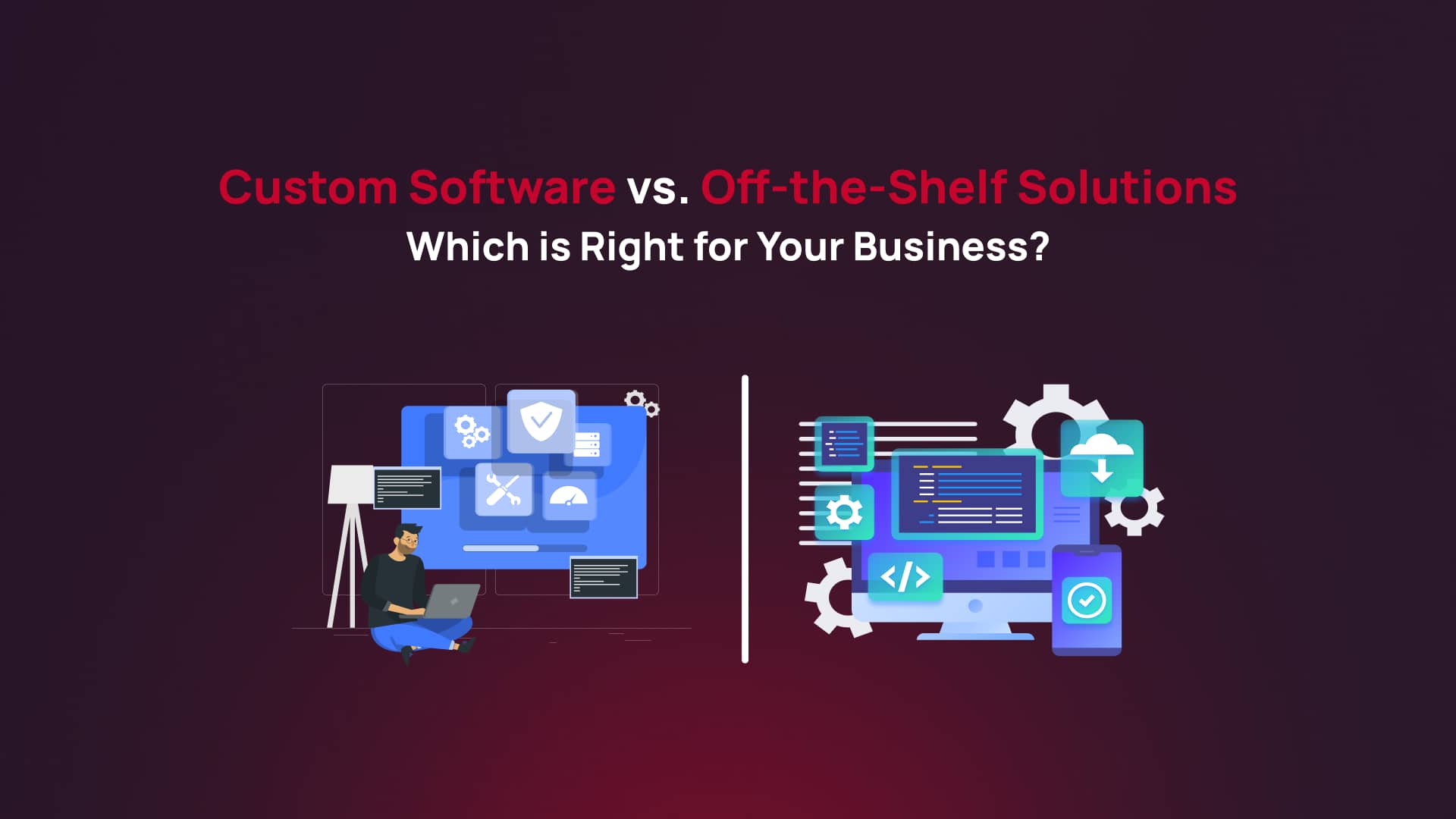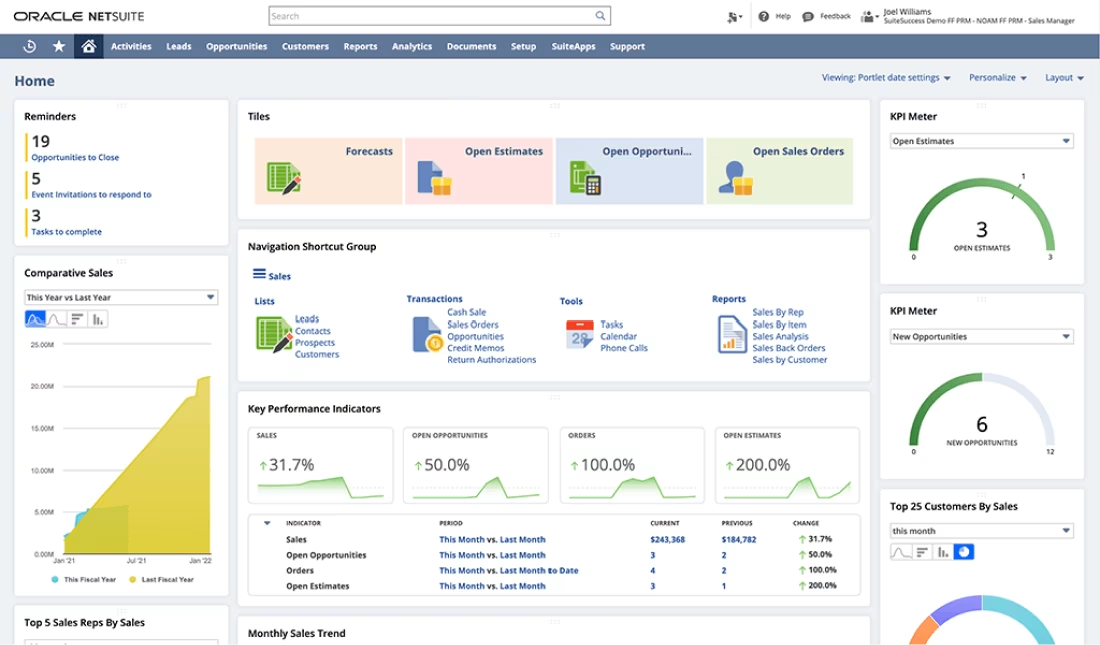Custom Software vs. Off-the-Shelf Software, Explained
Written by
Maryam Aslam
Last Updated: May 30, 2025

In this article
- What is the difference between custom and off-the-shelf software solutions?
- Advantages and disadvantages of off-the-shelf software
- Advantages and disadvantages of custom software
- What is ERP software development and customization?
- Which is better for your business: custom software or off-the-shelf software?
- Cost comparison and long-term ROI in custom software vs. off-the-shelf software
- Conclusion
Software Built for Success
From concept to deployment, we create custom software solutions that solve problems and drive results. Get Started with a Free Consultation Now.
In the past, the biggest challenge individuals faced was setting up their businesses and figuring out where to start. That initial step often caused the most hesitation. However, in today’s digital landscape, another critical decision plays a significant role in determining a business’s success or failure – choosing between custom software development solutions or an off-the-shelf alternative.
Regardless of whether it’s a large enterprise or a small organization, businesses rely on software to manage operations, streamline workflows and boost productivity. The right software improves efficiency and ensures smooth functionality. But this leads to a key question: should you opt for custom software development services or an off-the-shelf solution?
Every business faces this dilemma in its early stages, weighing the decision of whether to buy or build software. Both options come with their own advantages and drawbacks, and the best choice depends on your business needs, objectives, budget and timeline.
Let’s explore these solutions in detail to determine which one best suits your business.
What is the difference between custom and off-the-shelf software solutions?
Selecting the right software is a crucial decision that requires careful consideration of multiple factors. Understanding what is the difference between custom and off-the-shelf solutions can help businesses make informed choices.
One important factor to note is that services by a custom software development company may typically come with a higher cost compared to off-the-shelf solutions, but they also offer significant advantages.

Source: Getty Images
Custom software development involves building a solution from scratch, covering everything from design and development to testing and deployment. This approach caters to specific business needs, providing full control over features, security and system updates. With this level of control, businesses can adapt to evolving industry trends and scale effectively. However, custom software requires a longer development period and higher initial investment.
In contrast, off-the-shelf software solutions are pre-built software packages equipped with standard features. They are easy to implement, cost-effective and require minimal setup. While they may seem like an ideal option due to their affordability and quick deployment, they lack flexibility and may not align perfectly with unique business needs. In many cases, businesses must make additional modifications or invest in third-party tools to ensure proper functionality.
This comparison highlights that custom software development solutions offer greater flexibility and scalability, whereas off-the-shelf solutions come with inherent limitations. Custom software can evolve alongside business needs, while off-the-shelf solutions may struggle to keep up.
Additionally, for something like ERP software development, it allows for smooth system integration, but off-the-shelf software may require third-party integrations to achieve the same level of compatibility. We’ll take ERP software as an example further on in the article too.
Now that we’ve covered the fundamental differences between these two approaches, let’s examine their advantages and drawbacks to better understand which is better: custom or off-the-shelf software for your business?
Advantages and disadvantages of off-the-shelf software
Off-the-shelf software is pre-built and designed for general business needs. It is readily available, cost-effective and quick to deploy, making it an attractive choice for businesses looking for immediate solutions. However, its standardized nature can also pose limitations, especially for companies with unique operational requirements.
Benefits of off-the-shelf software
Affordability → One of its biggest advantages is cost-effectiveness. These solutions are usually budget-friendly, making them appealing to startups and small businesses.
Quick deployment → Since it’s pre-developed, businesses can implement it instantly without waiting for a lengthy development process.
Support & updates → Off-the-shelf software typically comes with dedicated customer support, regular updates, and extensive documentation, reducing the burden of maintenance.
Drawbacks of off-the-shelf software
Limited customization → These solutions are designed for a broad audience, meaning businesses may need to adjust their workflow to fit the software rather than the other way around.
Scalability issues → As businesses grow, they may outgrow the software’s capabilities, requiring additional tools or upgrades.
Integration challenges → Many off-the-shelf solutions require third-party plugins or modifications to work smoothly with existing business systems.
Some common examples of off-the-shelf software include:
Accounting software → QuickBooks, FreshBooks, Xero
CRM software → Salesforce, HubSpot, Zoho CRM
Project management tools → Trello, Asana, Monday.com
HR & payroll software → BambooHR, Gusto, ADP
Off-the-shelf solutions are ideal for businesses that need a quick and cost-efficient system. However, for companies with unique needs and long-term growth plans, custom software development solutions may be a better fit.
Advantages and disadvantages of custom software
Custom software is built from the ground up to match a business’s specific needs. It offers tailored functionality, better scalability, and convenient integration with existing systems. However, this level of customization requires significant investment and time. Partnering with an experienced, reputable custom software development company makes sure that the final product lines up perfectly with business goals.
Benefits of custom software
Custom functionality → Custom-built software includes only the features a business needs, improving efficiency and eliminating unnecessary tools.
Scalability & flexibility → As businesses grow, custom software can evolve with them, ensuring long-term adaptability.
Smooth integration → Unlike off-the-shelf solutions, custom software can integrate effortlessly with existing systems, reducing operational bottlenecks.
Enhanced security → Businesses handling sensitive data can implement custom security protocols, offering stronger protection against cyber threats.
Drawbacks of custom software
Higher initial cost → Custom development requires a larger upfront investment, covering design, development, and testing. However, the long-term benefits often outweigh the costs.
Longer development time → Unlike off-the-shelf solutions, custom software takes time to build, test, and deploy, which can delay immediate use.
Ongoing maintenance → Businesses must ensure regular updates, enhancements, and security patches to keep the software running smoothly.
For companies aiming for long-term efficiency and growth, investing in custom software development services provides a competitive edge. It improves workflow, optimizes data management and improves overall user experience.
What is ERP software development and customization?
ERP (Enterprise Resource Planning) software is designed to manage essential business functions like finance, supply chain, human resources and customer relationships. It provides real-time access to business operations, helping companies improve efficiency, streamline processes, and ensure accurate data across departments.

Source: NetSuite
By centralizing key functions, ERP systems reduce redundancies, improve collaboration and promote overall business performance.
Off-the-shelf ERP vs. custom ERP
Off-the-shelf ERP systems and custom ERP solutions serve different business needs. Both options have advantages and drawbacks, and the choice depends on specific business requirements.
1. Off-the-shelf ERP systems
Provides pre-built solutions like SAP, Oracle, and Microsoft Dynamics, suitable for a wide range of industries.
Businesses can deploy them quickly without waiting for development and testing.
Offers standard features, but may not accommodate specialized needs as a business grows.
Initially cost-effective but may require additional spending on third-party integrations and modifications over time.
2. Custom ERP systems
Developed specifically to match a business’s unique processes and future plans.
Allows flexibility to evolve with the company’s changing needs.
Integrates with existing software efficiently, avoiding issues that can arise with off-the-shelf options.
Delivers long-term value by optimizing operations and reducing inefficiencies.
Why customize ERP systems?
Custom ERP development takes time but delivers significant benefits, depending on the expertise of the development team. Unlike generic solutions, it is built to support business-specific processes, reducing unnecessary manual work.
As a company expands, a custom ERP system scales without licensing restrictions or compatibility concerns. It also improves data management by providing real-time insights through specialized dashboards.
Security is another advantage, as custom protections can be implemented to match the business’s operational needs. For companies focused on long-term growth, adaptability and efficiency, a customized ERP system is a strong investment.
Which is better for your business: custom software or off-the-shelf software?
Choosing the right software depends on your business size, operational needs, long-term goals, complexity, and budget. To make the right decision, consider key factors:
Does your business have a unique workflow that requires special integrations?
Can you afford a high upfront investment, or do you need a ready-to-use solution?
Will the software need modifications as your business grows?
Does it need to integrate with existing systems?
Do you require advanced security features for sensitive data?
If your business needs a standard solution with quick deployment and a lower initial cost, off-the-shelf software is the practical choice. However, if you operate at scale with unique processes, a custom-built system offers greater flexibility and long-term efficiency.
Cost comparison and long-term ROI in custom software vs. off-the-shelf software
Understanding the costs and potential returns of software investments is crucial for business planning. The decision involves evaluating both the initial costs and the long-term return on investment (ROI).
1. Initial and ongoing costs
Off-the-shelf software generally has a lower initial cost since it is mass-produced and designed for broad use. It usually comes with a subscription-based pricing model, requiring monthly or annual payments. Over time, costs can add up due to licensing fees, third-party integrations or customization expenses.
Custom software, on the other hand, requires a higher initial investment due to development, testing, and implementation costs. However, once deployed, there are no recurring licensing fees. The long-term financial commitment is more predictable, allowing businesses to control costs over time.
2. Long-term ROI
While off-the-shelf software may seem cost-effective initially, it can limit growth due to its predefined structure. As technology advances, businesses relying on standard software often need to reinvest in upgrades or new solutions. Additionally, inefficiencies caused by lack of customization may lead to productivity loss and operational bottlenecks.
Custom software is built with future scalability in mind, adapting to business needs as they evolve. It minimizes inefficiencies and redundancies while improving workflow efficiency. Unlike off-the-shelf software, which may require third-party support to address operational gaps, custom solutions provide a more structured and efficient approach to business processes. This results in higher productivity and profitability over time.
Conclusion
Choosing the right software requires careful planning. Consider your business needs, operational complexities, future goals and budget to make an informed decision.
Off-the-shelf software offers a cost-effective and quick-to-deploy solution, making it suitable for small businesses with basic operational needs. However, it comes with limitations in customization, licensing fees, and potential integration costs. As businesses expand, these limitations may create challenges that require additional investments.
Custom software development provides greater flexibility, better functionality and long-term cost benefits. While it requires a higher upfront investment, it eliminates licensing fees and offers custom solutions that align with business objectives. For businesses prioritizing growth, efficiency and security, custom software is often the better choice.
Evaluate your business’s long-term plans and technological needs before making a decision. The software you choose will play a critical role in shaping your company’s future success.




